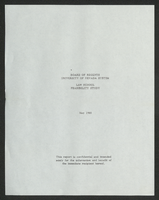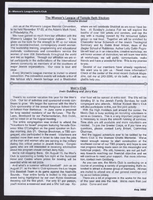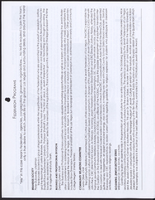Search the Special Collections and Archives Portal
Search Results
Lisa Levine (University of Nevada Regent) oral history interview conducted by Magdalena Martinez: transcript
Date
Archival Collection
Description
From the Lincy Institute "Perspectives from the COVID-19 Pandemic" Oral History Project (MS-01178) -- Elected official interviews file.
Text

Hernando Amaya oral history interview: transcript
Date
Archival Collection
Description
Oral history interview with Hernando Amaya conducted by Laurents Banuelos-Benitez, Marcela Rodriguez-Campo, and Barbara Tabach on October 18, 2018 and December 3, 2018 for the Latinx Voices of Southern Nevada Oral History Project. In this interview, Hernando Amaya talks about his childhood and education in Bogota, Colombia. He discusses his start in journalism as a young man and working for El Espectador, the Colombian national newspaper. He discusses his experiences reporting on the narco-terrorism occurring in Medellin, Colombia and how this eventually led to his immigration to the United States. Amaya moved to Las Vegas, Nevada in 2001 and continued his career in journalism by working for local Spanish speaking papers and websites. He relates his civic involvement in the Las Vegas area, his work as the president of the Colombian Association of Las Vegas, and various other civic engagements. As a journalist, he asserts the importance of knowing one's culture, storytelling, learning history, and being active in the community.
Text

University of Nevada System Board of Regents Law School Feasibility Study
Date
Archival Collection
Description
Folder contains a Law School Feasibility Study for the Board of Regents of the University of Nevada System conducted by management consultants Cresap, McCormick and Paget Inc. From the University of Nevada, Las Vegas William S. Boyd School of Law Records (UA-00048).
Text

Luceanne "Lucy" Taufa oral history interview: transcript
Date
Archival Collection
Description
Oral history interview with Luceanne "Lucy" Taufa conducted by Jerwin Tiu, Cecilia Winchell, and Stefani Evans on December 16, 2022 for Reflections: the Las Vegas Asian American and Pacific Islander Oral History Project. In this interview, Taufa describes growing up on the Tongan island of Vava'u in a large family and later immigrating to the United States. She recalls her father first immigrating to Hawaii, and after obtaining a green card, her and her siblings following shortly after. While Kaufa's older siblings continued to pursue higher education and her younger siblings were too young to work, she took on a bulk of the responsibility to provide income and navigate life in Hawaii for her family. Eventually, Lucy moved to Dallas, Texas, met her husband, and moved to Las Vegas, Nevada for her husband's job. Later in the interview, she discusses joining the Culinary Union after experiencing racial discrimination at her workplace and her pride in her identity as a Tongan woman.
Text
Ronzone Family Papers
Identifier
Abstract
Ronzone Family Papers (1900-1991) include newspaper clippings, business documents, correspondence, certificates, yearbooks, publications, artifacts, and photographs. The papers document their lives in Nevada, their department store, and Dick Ronzone's involvement in local politics.
Archival Collection





